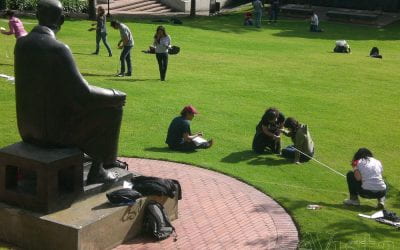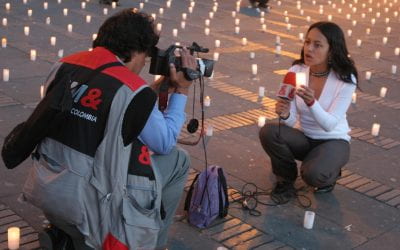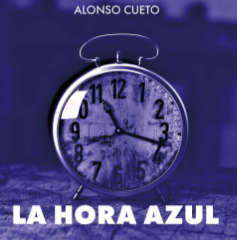Looking at Violence
It wasn’t the first time and it won’t be the last time that a group of Harvard faculty has focused on the issue of violence.
What made the November 26, 2007, seminar on “Criminal Violence, State Responses and Human Rights in Latin America” different is that it was part of a series of ongoing discussions by the David Rockefeller Center for Latin American Studies Social Policy Group.
Fernando Reimers, Professor of International Education and Director of Global Education and of International Education Policy at Harvard University, and Arachu Castro, Assistant Professor of Social Medicine in the Department of Social Medicine at Harvard Medical School, serve as co-chairs of the committee, which seeks to foster interdisciplinary collaboration at Harvard on evidence-based social policy reform.
The seminar focused on the multifaceted expressions of violence that affect the daily lives of people in Latin America. Much of the discussion was devoted to criminal violence, state responses and human rights.
James Cavallaro, Clinical Professor of Law at Harvard Law School and Executive Director of the Human Rights Program at the Law School, led a lively and far-ranging discussion on violence. Cavallaro’s own violence-related projects range from “No Place to Hide” on gang violence in El Salvador, police response to the May 2006 attacks in São Paulo, and security in Paraguay.
Philip B. Heymann, James Barr Ames Professor of Law at the Harvard Law School, pointed out that better and more effective law enforcement—including fair defense—was needed to control crime. However, he stressed that a systematic problem existed because of impunity and a lack of widespread belief in law and legal institutions.
Many participants agreed on the need to look at violence as a structural problem, rather than as a series of incidents. And just as there are many types of violence, there need to be many different types of response.
“Violence is beyond crime,” observed Castro. “People react to violence by wanting to have a very big brother that protects you.”
Winter 2008, Volume VII, Number 2
June Carolyn Erlick is the editor-in-chief of ReVista and the author of Disappeared, A Journalist Silenced (Seal Press, 2004) and Una gringa en Bogotá (Aguilar, 2007). For more information on the DRCLAS Social Policy Group, contact Kit Barron, chbarron@fas.harvard.edu.
Related Articles
Maintaining Academic Excellence in Latin American Universities
The Iniciativa para el Desarrollo de la Innovación Académica (IDIA), a teaching and learning initiative of LASPAU, helps higher education institutions in Latin America address the perennial…
Sobre Envíos Epistolares y Violencias
A través del proyecto “Cartas de la Persistencia”, liderado por la Biblioteca Luis Angel Arango del Banco de la República, la Secretaría Distrital de Cultura y Turismo de Bogotá y el Instituto Pensar…
Novelas
La hora azul de Alonso Cueto es la historia de Adrián Ormache, un destacado abogado limeño que, luego de la muerte de su madre, comienza a descubrir una pasado familiar ciertamente…




